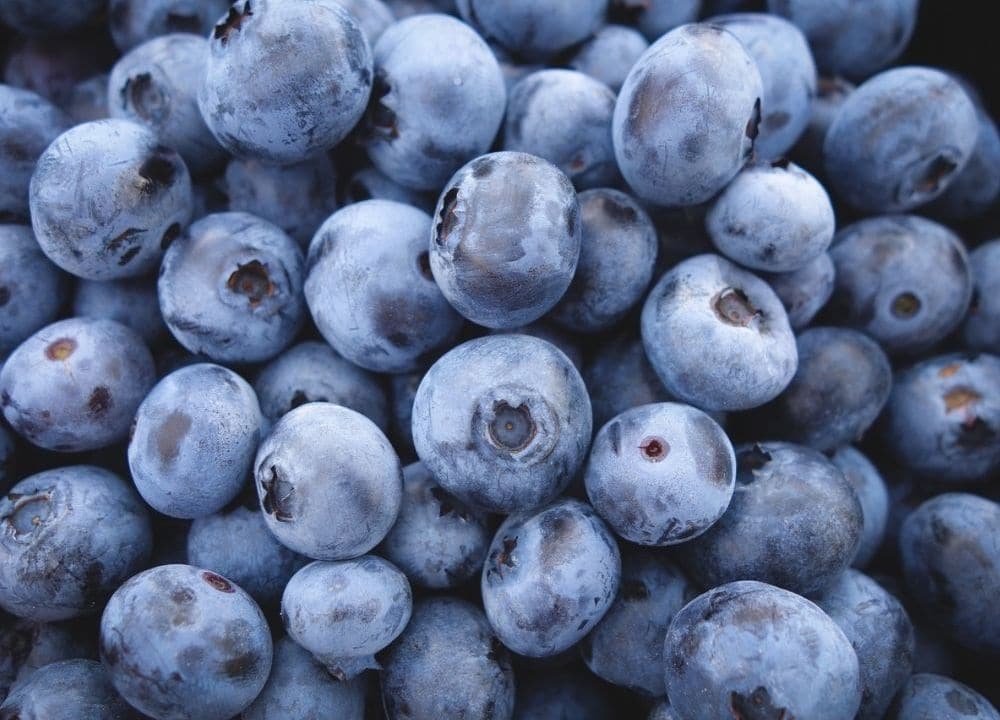There has been a lot of interest in the topic of blueberries and dementia when looking into the foods that can help improve memory.
For years, researchers have been looking into whether consumption of blueberries can help prevent the onset of dementia or perhaps slow down its progression.
This is because blueberries have been known to keep blood vessels clear of plaque, fight off the harmful effects of free radicals, and give people a boost from plant-based chemicals.
Contents
Blueberries and Dementia Prevention Benefits
The little blue fruits have also gained a reputation for being brain food that can improve memory and cognitive function.
Several studies have been done to identify the link between berries and this progressive illness.
Below we explore a couple of studies that investigated the link between dementia and blueberries.
Blueberries can Help Slow Cognitive Decline

Research published in Annals of Neurology reported that consuming flavonoids and berries slows down the rate of cognitive decline in women who are 70 years and older.
The study utilized data from a Nurse’s Health Study with over 120,000 registered nurses.
The researchers conducted the assessments on 16,010 participants all of whom were women. The Nurses Health Study commenced in 1976.
After four years, the participants were mostly asked questions about their eating habits. Over 16, 000 ladies also underwent memory testing between 1995 and 2001.
Researchers from different institutions including Harvard Medical School, Brigham Women’s Hospital, and German Centre for Neurodegenerative Disease uncovered that greater ingestion of strawberries and blueberries correlated with slower cognitive decline rates for up to two and a half years.
The ladies who showed the most improvement were taking two or more servings of berries weekly.
The authors of the study acknowledged that smaller trials of berry supplementation have also showcased positive results. They also stated that the study was only observational seeing that it primarily relied on dietary reporting from the nurses.
Furthermore, they also reported that it was not clear if the results would also apply to men because all the participants were ladies.
The authors encouraged males to take part in future studies to come up with more conclusive results. They also encouraged seniors to consume more berries as they can help delay memory decline.
Blueberries can Boost Brain Function

Some studies also confirm that blueberries do not only improve memory, but they can also maintain brain functionc.
Animal studies investigating ties between blueberries and dementia reveal that blueberries contain tons of phytochemicals that have a wealth of anti-inflammatory and antioxidant effects.
Additionally, anthocyanins and polyphenols present in blueberries can boost signaling in the brain centers that are associated with memory.
They also help to eliminate glucose which also helps to slow down memory decline.
Human studies on the same have also yielded promising results. In one of these studies, 12 seniors who had mild cognitive impairment took blueberry juice daily.
Blueberries can Improve Working Memory
They experienced improvements in functions of the brain and there was also evidence of improvements in working memory. This research is from the University of Exeter.
The researchers looked into the effects of the consumption of wild blueberry juice on memory decline in 12 adults who were aged 65-77. All the participants were experiencing memory decline related to aging showcasing symptoms like memory lapses.
The participants took 2 1/2 cups of blueberry juice for 12 weeks. This juice was made from commercially available frozen wild blueberries.
A comparison group of 14 adults was drinking a similar amount of placebo non-juice beverage for twelve weeks.
Researchers conducted several memory tests such as list learning, recall, and word association tasks before and after the study. The professionals also used an MRI scanner to monitor the brain function of the participants.
They also measured resting blood flow. The results indicated that the older adults who drank blueberry juice showed improvements in memory and learning tests when compared to the placebo group.
Researchers also said that they observed trends that suggested lower glucose levels and reduced depression symptoms among the participants who were drinking wild blueberry juice.
It is important to note that this study on blueberries and dementia excluded people who consumed more than 5 portions of vegetables and fruit daily.
The participants were told to stick to their normal diet throughout the entire study. Based on the results, more research needs to be done to confirm these results.
Blueberries May Lower the Risk of Dementia

Blueberries are categorized among the superfoods linked to a lower risk of dementia.
A study published in the American Journal of Clinical Nutrition observed 2,801 women and men who were over 50 years. At the beginning of the study, all the participants did not have dementia.
Over at least 20 years of follow-up, the professionals collected diet information at 5 periodic health examinations. 193 participants during this time developed Alzheimer’s disease or other types of dementia.
Lowered dementia risk was associated with intake of one type of flavonoid, anthocyanins abundant in red wine, strawberries, and blueberries.
Other foods that also contributed include oranges, pears, apples, tea, and bananas. The study controlled for numerous behavioral and health characteristics.
Additionally, subjects adhered to the government’s Dietary Guidelines for Americans which in addition to vegetables and fruits also emphasizes lean meats, whole grains, and other heart-healthy foods.
Paul F. Jacques the senior author of the study who is a scientist with Jean Mayer USDA Human Nutrition Research Centre on Aging at Tufts University stated that consumption by the individuals who benefited was not huge.
The monthly average was about 71/2 cup serving of blueberries or strawberries, 17 cups of tea, and 8 apples or pears.
He explained that it did not take much and all it took was a couple of servings of berries weekly and maybe an apple or two.
Closing Thoughts
Health providers continue to be faced with multiple questions about recommendations for enhancing or maintaining cognitive function especially for people who have dementia.
Currently, several studies have been done to try and find out if there is a connection between the consumption of blueberries and dementia prevention.
Although many experts agree that taking blueberries is beneficial for the brain, further research is still necessary to confirm if they can help persons with dementia.







